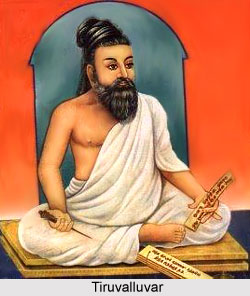 Thiruvalluvar is a celebrated Tamil poet who is credited with writing the Thirukkural, an ethical work in Tamil literature. It is regarded as the finest of all Tamil classics and immoral Tamil work. The birth date of Tiruvalluvar is little bit blurred among scholars. While some say that he lived in the 2nd century B.C. others date him much later, even as late as the 8th century A.D. Some also consider him as a Jain showing internal textual evidence from Thirukural. Thiruvalluvar was also known as Valluvar.
Thiruvalluvar is a celebrated Tamil poet who is credited with writing the Thirukkural, an ethical work in Tamil literature. It is regarded as the finest of all Tamil classics and immoral Tamil work. The birth date of Tiruvalluvar is little bit blurred among scholars. While some say that he lived in the 2nd century B.C. others date him much later, even as late as the 8th century A.D. Some also consider him as a Jain showing internal textual evidence from Thirukural. Thiruvalluvar was also known as Valluvar.
Whether Valluvar was a Jain or a Hindu is a matter of raging controversy. The fact that all sections claim him as their own is proof enough about the greatness of the author and the outstanding book written by him.
There are a few legends associated about the birthplace of Thiruvalluvar. However, one legend also associates him to Madurai, the ancient capital of the Pandya Dynasty who vigorously promoted Tamil literature. According to another legend he was born and lived in Mylapore, a part of current day Chennai city. It is believed that Thiruvalluvar travelled to Madurai to submit his work, the Thirukural, for approval of the Emperor (Pandian) and his college of poets.
Work of Thiruvalluvar
Thirukkural is one of most revered works of Thiruvalluvar. It consists of 133 athikarams or chapters. Each athikaram consists of ten kurals (rhyming Tamil couplets) therefore making 1330 kurals in total. The word kural means short and is a variation of a metre in Tamil known as venba. Therefore the book is named after that metre and the prefix `tiru` is to indicate its sacred nature. The first chapter of the Kural is an invocation to God, but Valluvar does not mention any particular deity. This book is divided into many sections - the first is Aratuppal consisting of thirty-eight chapters including the preface with consists of four chapters; the second is Porutpal with seventy chapters and the third is Kamattuppal with twenty-five chapters. The first section is concerned with arani or dharma. It means doing things with moral sense and honour, for the good of the poor people, the second with polity and administration and the third and last section with love themes. There are 38 chapters in the first section, 70 chapters in the second and 25 chapters in the third section.
The Kural is arranged according to the conventional classification of the three goals of life namely virtue, wealth and love. The fourth goal, liberation has not been dealt with separately by the author.



















